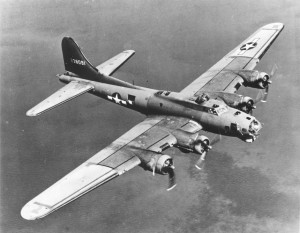Seventy years. That’s how long it takes to forget a war — for most of us.

One time I found a note a woman left for her dad. It was stuck in the edge of a document holder near the aft crew door of a WWII-era B-17 bomber. On one side was a photo of a smiling young airman. On the other, a personal note to her father about her flight that day, 70 years after her dad’s last flight. She’d finally connected with a dad she never met. He was shot down over Germany before she was born.
I have the honor of touring the country in one of the few remaining B-17 bombers. It had a crew of 10, mostly teenagers, and they turned the tide of the war in Europe — but at a great cost. The 8th Air Force in England lost almost twice as many men as the Marines in Vietnam.
This year is the 70th anniversary of the end of World War II. Like Victory in Europe day, or V-E day every May, I’ve seen other World War II milestones pass this year with little or no mention in the news. Tom Brady and “deflategate” sure made headlines, though.
I’ve had the privilege this summer of meeting the 90-year-old heroes that still remember — and not all of them wore a military uniform. The generation left at home sacrificed, too. Food, gasoline, clothes, tires, chrome car bumpers and coffee were all rationed. Hard-working heroes made it without coffee.
No one wins a war, but we came together as a nation and prevailed, largely by out-producing the enemy. A new airplane rolled out the factory door every hour. Over 5,000 ships were built in new shipyards around the country. An airbase was built on the unpopulated Adak island in 10 days. Sure, mistakes were made but as a country we stood united against the foes.
Now they all move a little slower — the tail gunner, Rosie the Riveter, the nurse, the farmer who stayed home to produce food. They all have the youthful memories and the same humble attitude — “no big deal,” they say, “we were just doing what had to be done.”
They did. And because of they did, the war ended 70 years ago on Sept. 2, 1945, when the Japanese signed the surrender documents aboard the USS Missouri in Toyko bay.
The deadliest conflict in human history was over.
But World War II’s legacy lives on. Here is some of what the war brought us:
- Peal Harbor
- Rationing
- Japanese internment camps
- Bataan death march
- London Blitz
- Whittier
- United Nations
- Holocaust
- U.S. saving bonds
- Spam
- Japanese invasion of Attu Island
- Attu villagers in Japan as POWs
- Women in the workplace… wearing pants
- Nanking massacre – 200,000 Chinese civilians killed
- Displacement of Aleuts to camps in Southeast Alaska
- The Al-Can
- Baby boomers
- Two Atomic Bombs detonated
- Forced euthanasia of 750,000 Romas and others deemed ‘undesirables’
- More than 70 million civilian and military causalities worldwide
I’ll tour the country next summer with the B-17, listening to stories of the greatest generation and sharing them with future generations.
Seventy years is too soon to forget.




